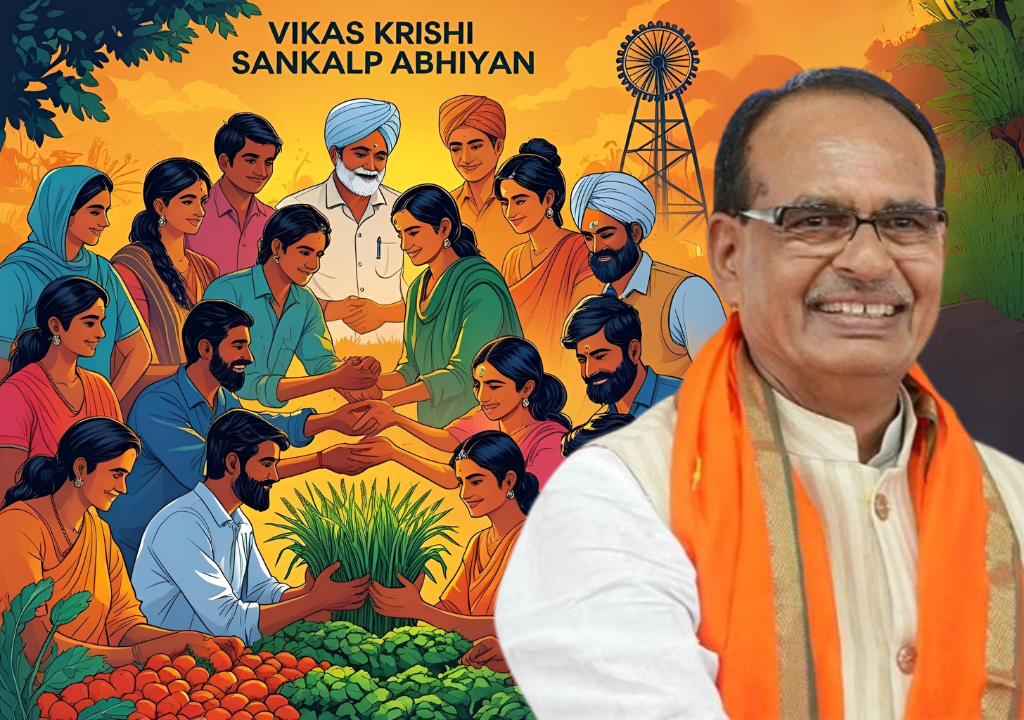The Viksit Krishi Sankalp Abhiyan (VKSA), launched on May 29, 2025, by Union Agriculture Minister Shri Shivraj Singh Chouhan, marks a significant stride towards realizing the vision of a Viksit Bharat by 2047. This nationwide campaign aims to bridge the gap between agricultural research and field-level implementation, ensuring that scientific advancements reach the grassroots level.
Campaign Overview
Spanning from May 29 to June 12, 2025, the Viksit Krishi Sankalp Abhiyan is a concerted effort involving:
- 2,170 teams comprising over 16,000 scientists and experts
- Coverage of 65,000 villages across more than 700 districts
- Direct engagement with approximately 1.5 crore farmers
These teams are tasked with disseminating knowledge on modern agricultural practices, climate-resilient crops, and sustainable farming techniques.
Links Suggested: NITI Aayog Holds Key Consultative Meet on Ease of Doing R&D in Lucknow
Objectives of the Viksit Krishi Sankalp Abhiyan
The primary goals of the VKSA include:
- Promoting Sustainable Agriculture: Encouraging practices like organic farming, integrated pest management, and the use of bio-fertilizers.
- Enhancing Technological Adoption: Introducing farmers to drone technology, precision farming, and advanced irrigation methods.
- Improving Soil Health: Educating on soil testing, balanced fertilizer use, and the benefits of crop rotation.
- Diversifying Income Sources: Advocating for allied activities such as dairy farming, fisheries, and beekeeping.
- Facilitating Access to Government Schemes: Informing farmers about initiatives like PM-Kisan, Fasal Bima Yojana, and the use of Soil Health Cards.
Lab-to-Land Approach
A cornerstone of the Viksit Krishi Sankalp Abhiyan is its Lab-to-Land strategy. This approach ensures that scientific research and innovations are not confined to laboratories but are translated into practical applications for farmers. Teams comprising scientists from the Indian Council of Agricultural Research (ICAR), Krishi Vigyan Kendras (KVKs), and agricultural universities are actively engaging with farmers to:
- Demonstrate new farming techniques
- Provide hands-on training
- Gather feedback to refine research objectives
Regional Implementations and Success Stories
Uttar Pradesh: Leading the Charge
Under the leadership of Chief Minister Yogi Adityanath, Uttar Pradesh aims to reach 50 lakh farmers, accounting for one-third of the national target. The state has organized over 10,000 programs across 75 districts, focusing on:
- Farmer-Scientist Dialogues: Facilitating direct interactions between farmers and experts.
- Promotion of Natural Farming: Encouraging eco-friendly practices to enhance soil fertility.
- Infrastructure Development: Upgrading 89 KVKs into centers of excellence.
Links Suggested: PM Pragati Meeting Infrastructure Projects Rera-semiconductor Ecosystem
Odisha: Integrating Aquaculture
In Odisha, the campaign’s launch at ICAR-CIFA highlighted the integration of aquaculture into the agricultural framework. A notable development was the release of “CIFA Argu VAX–I”, a novel fish vaccine targeting parasitic infections, showcasing the campaign’s commitment to holistic agricultural development.
Arunachal Pradesh: Reaching Remote Areas
Arunachal Pradesh has set an ambitious target to engage 3.25 lakh farmers across 1,380 villages. The state employs Krishi Raths—mobile units delivering agricultural knowledge and resources—to traverse its diverse terrain, ensuring that even the most remote farmers are included.
Nicobar Islands: Empowering Tribal Communities
In the Nicobar Islands, the campaign focuses on empowering tribal farmers by:
- Distributing Soil Health Cards, fishing licenses, and high-quality seeds
- Conducting door-to-door outreach and interactive sessions
- Promoting scientific agricultural practices tailored to local needs
Prime Minister’s Vision
Prime Minister Shri Narendra Modi emphasized the significance of the Viksit Krishi Sankalp Abhiyan in his address, stating:
“Under this campaign, our team of scientists will go from lab to land, providing information about modern agriculture to farmers with all the data to help the farmers before the season starts.”
He highlighted the campaign’s role in transforming Indian agriculture into a cornerstone of a developed India, urging farmers to actively participate and adopt modern practices.
Immediate and Long-Term Impacts
Short-Term Benefits
- Enhanced Preparedness for Kharif Season: Timely dissemination of information ensures farmers are well-equipped for the upcoming planting season.
- Increased Awareness: Farmers gain knowledge about sustainable practices, leading to immediate improvements in yield and income.
Long-Term Transformations
- Resilient Agricultural Ecosystem: Adoption of climate-resilient crops and techniques fortifies agriculture against environmental challenges.
- Economic Empowerment: Diversification into allied sectors provides additional income streams, reducing dependency on traditional farming.
- Technological Integration: Embracing modern tools and methods positions Indian agriculture on a global platform.
Conclusion
The Viksit Krishi Sankalp Abhiyan stands as a testament to India’s commitment to transforming its agricultural landscape. By fostering collaboration between scientists, policymakers, and farmers, the campaign paves the way for a sustainable, inclusive, and prosperous agricultural sector. As the nation strides towards the vision of Viksit Bharat 2047, initiatives like the VKSA play a pivotal role in ensuring that the backbone of the country—its farmers—are empowered, informed, and equipped to lead the charge.

